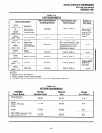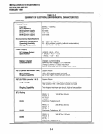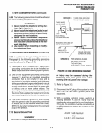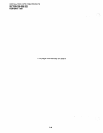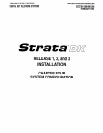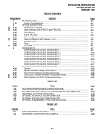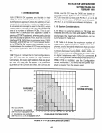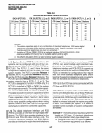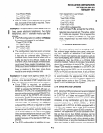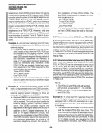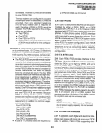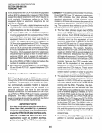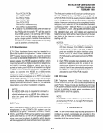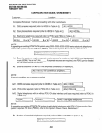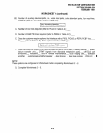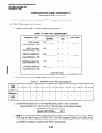
0
Two PCOU PCBs
Two PEKU PCBs
One PSTU PCB
Each of these PCBs requires one universal
slot, so a total of five slots is required. There-
fore, a DK24 can be used.
Example
2-A bank branch office needs nine CO
I
lines, seven electronic telephones, five digital
telephones, and 11 standard rotary type tele-
phones.
l
The PCB configuration (in addition to
Release
3 common equipment) is as follows:
Three PCOU PCBs
One PEKU PCB
I
One PDKU PCB
Two PSTU PCBs
l
The configuration requires seven universal
slots; therefore, DK24 is ruled out, because
it has only six universal slots. Offering 14
universal slots, DK96 could be used, but it is
a little too big for the office’s needs at the
moment. DK56, with its eight universal slots,
could meet those needs immediately. Also,
DK56 could accomodate some expansion of
lines or stations in this case, since there
would be one empty universal slot.
Example
3-A large travel agency needs 18 CO
I
lines, 14 electronic telephones, 14 digital tele-
phones, nine standard DTMF telephones and
one FAX machine, all connected to one system.
l
Since DTMF is required, an additional
subassembly (CRCU) is needed to translate
DTMF to signals that STRATA DK can un-
derstand. The CRCU is a subassembly that
mounts on the common control PCB (PCTU),
which is part of the STRATA DK common
equipment. The PCTU has its own dedicated
slot in the KSU separate from the available
universal slots. In summary, an additional
subassembly (CRCU) is required for DTMF
but the maximum number of universal slots
remains at six for DK24, eight for DK56, and
14 for DK96. Lastly, a FAX machine is treated
like a standard telephone and can use DTMF
dialing, since the capability exists in the
system because of the standard DTMF tele-
phones.
l
The PCB configuration (in addition to com-
0
2.01
INSTALLATION-CONFIGURATION
SECTION 200-096-204
FEBRUARY 1991
mon equipment) is as follows:
Five PCOU PCBs
.
Two PEKU PCBs
Two PDKU PCBs
I
One PSTU PCB
One PESU PCB
One CRCU subassembly
Each of these PCBs, except for the CRCU,
requires one universal slot. Therefore, a total
of 11 slots are required. This is beyond the
capacity of DK24 and DK56 (six and eight
slots, respectively) but well within DK96’s
capacity.
2 OPTION INTERFACING
Numerous options, such as a paging ampli-
fier, external page interface (one zone), relay con-
trol, etc., require an additional PC6 called the
PEPU. If even more options are required, such as
multi-zone paging, alarm sensor, SMDR or remote
maintenance, then the PIOU or a PIOUS PCB
would be needed. Table 4-D provides more details
about the capabilities of these PCBs. Only one of
these PCBs would be needed in a STRATA DK
system because the PIOU can do everything the
PEPU or PIOUS can do and more. If any of these
options are required, one universal slot is needed
to accommodate the appropriate PCB, thereby
reducing the maximum CO line/station capabilities
by eight station ports or four CO lines. Only one
option PCB is allowed per DK system.
2.10 DDSS and DSS Consoles
2.11 Up to four DSS consoles can be accomodated
by DK24, DK56, or DK96 equipped with a PCTUI
or 2 (PCTUl or 2 does not support DDSS con-
soles). Up to four DDSS consoles, or up to four DSS
consoles, or any combination up to four can be
accommodated by a DK24, DK56, or DK96
equipped with a PCTU3. A DK24 equipped with a
PCTUSl can support up to three DSS consoles
only (PCTUSl cannot support DDSS consoles). In
addition, the application of DDSS consoles is flex-
ible so that one to four DDSS consoles can be
assigned to one digital or electronic telephone, or
one DDSS console to each of four digital or elec-
tronic telephones, or any intermediate combination
(this also applies to DSS consoles and electronic
4-3



